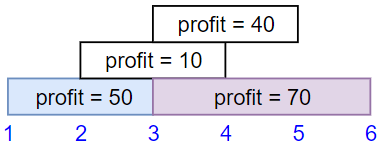LeetCode 솔루션 분류
[11/26] 1235. Maximum Profit in Job Scheduling
본문
Hard
466555Add to ListShareWe have n jobs, where every job is scheduled to be done from startTime[i] to endTime[i], obtaining a profit of profit[i].
You're given the startTime, endTime and profit arrays, return the maximum profit you can take such that there are no two jobs in the subset with overlapping time range.
If you choose a job that ends at time X you will be able to start another job that starts at time X.
Example 1:

Input: startTime = [1,2,3,3], endTime = [3,4,5,6], profit = [50,10,40,70] Output: 120 Explanation: The subset chosen is the first and fourth job. Time range [1-3]+[3-6] , we get profit of 120 = 50 + 70.
Example 2:

Input: startTime = [1,2,3,4,6], endTime = [3,5,10,6,9], profit = [20,20,100,70,60] Output: 150 Explanation: The subset chosen is the first, fourth and fifth job. Profit obtained 150 = 20 + 70 + 60.
Example 3:

Input: startTime = [1,1,1], endTime = [2,3,4], profit = [5,6,4] Output: 6
Constraints:
1 <= startTime.length == endTime.length == profit.length <= 5 * 1041 <= startTime[i] < endTime[i] <= 1091 <= profit[i] <= 104
Accepted
168,543
Submissions
315,081
관련자료
댓글 1
학부유학생님의 댓글
- 익명
- 작성일
Runtime: 1631 ms, faster than 30.10% of Python3 online submissions for Maximum Profit in Job Scheduling.
Memory Usage: 27.4 MB, less than 65.43% of Python3 online submissions for Maximum Profit in Job Scheduling.
Memory Usage: 27.4 MB, less than 65.43% of Python3 online submissions for Maximum Profit in Job Scheduling.
import bisect
class Solution:
def jobScheduling(self, startTime: List[int], endTime: List[int], profit: List[int]) -> int:
jobs = sorted(zip(startTime,endTime, profit), key=lambda x:x[1])
dp = [[0,0]]
for s,e,p in jobs:
i = bisect.bisect_left(dp, [s+1])-1
if dp[i][1] + p > dp[-1][1]:
dp.append([e, dp[i][1]+p])
return dp[-1][1]









